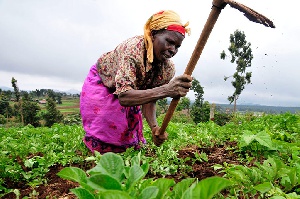In a bid to resolve the age-old challenge of lack of access to credit by small-holder farmers, government has said it will dialogue with the central bank and commercial banks to fashion out strategies to assist farmers.
“We are working to change the environment in terms of bank credit that should go to the farmers; we are working with the central bank and commercial banks to see how we can bring about a better situation for farmers in terms of credit,” Fiifi Kwetey told B&FT in an interview at the Agritech 2015 breakfast meeting in Accra.
The Banking sector has been wary of funding the sector due to concerns over high default rate among farmers.
President Mahama, who was at the 38th session of the IFAD Governing Council in Rome, Italy admitted that he was aware of this worrying trend but encouraged rural household farmers to patronise the amended EDAIF fund, which is rolling out innovative funding to farmers.
The Agric Minister also disclosed that the fertilizer subsidy programme will continue at a subsidized rate of 20%.
“We don’t want to change it for now. So we will still be at 20percent,” he said.
Irrigation has been identified as one of the best ways to go in modernizing agriculture, and the minister said government is “working extensively at changing the whole irrigation structure in order to help farmers have more access to water.”
Other interventions from government include plans to invest in warehouses to reduce post-harvest losses and also upgrade infrastructure that farmers need like feeder roads to help in transporting produce.
Another area the Ministry intends to push is to forge closer collaboration with the Trade Ministry: “We want to resolve the issue of markets for farmers because that is a fundamental one; farmers need to produce and know that there is certainty for them to sell at a good price. It is too much hell for them after doing production to now be struggling to be able to get proper markets,” he added.
Government is currently waiting for Parliament’s approval for a US$36million Ghana Agricultural Sector Improvement Programme. This will support farmers to expand by rice production and other commodities which the country imports at a very high cost.
Click to view details



Business News of Friday, 6 March 2015
Source: B&FT
Gov’t appeals to banks to give loans to farmers
Entertainment
















